I have such a fantastic column for you this month! Want to know why? Well, there are half a dozen awesome novels here, but the main reason you’re getting such a lengthy column is that I read the novels and then wrote last month’s column and… never sent it. Then I started reading the novels for this month, had to travel home because my uncle died…and forgot to send this month’s column. Hah. Let that be a lesson, boys and girls and nonbinary folks: when you do a lot, make sure you’re actually doing all of it. Now let’s get to it.
___________________________________
MAY
___________________________________
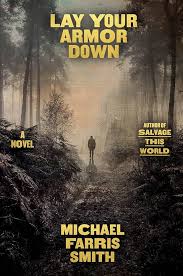
Michael Farris Smith is one of those writers whose work pushes against the limits of strict genre definitions. Mostly known as a crime fiction author, Farris Smith works in the interstitial spaces between genres and consistently delivers narratives that defy categorization while also being the kind of novels you can simply call outstanding. Lay Down Your Armor, Smith’s latest, is no different.
The least you know about Lay Down Your Armor, the harder it will hit. That said, you need a synopsis here, so I’ll give you one. Two criminals land a gig retrieving something mysterious. That something turns out to be a girl who is rumored to have powers and who doesn’t talk to them. Take this premise and add a woman who finally manages to talk to the girl, an old woman with dementia whose absence haunts a few pages, and more bad people who want the girl. Now throw everything into a blender and then serve that with a side of violence.
There is a beautiful simplicity to this novel; broken people doing bad things and then trying to do the right thing but not knowing exactly what that looks like. Farris Smith brings to the table a combination of snappy dialogue, fast-paced action, great characterization despite the spare prose, and writing in which things that shouldn’t work do work. That line might be confusing, so let me explain. Take, for example, the use of “and.” I’ve used it here. I’ve used it in every novel and probably every review I’ve ever written. It’s a conjunction everyone uses all the time, but Farris Smith uses it like no one else:
“The old woman’s phone kept ringing as the sun peeked over the edge of the horizon and it rang as the sun rose higher and burned away the morning mist that damped the countryside. It ran as the birds began to sing and as the wind chimed and it rang as the mail truck puttered along the road and stopped and the postman shoved more into the stuffed mailbox and it kept ringing until the sun was high and yellow and sitting atop the sky and then it stopped. A family of raccoons sat on their haunches and stared at the phone on the wall and listened to it ring before turning their attention back to the paradise of the littered kitchen.”
That’s all about a phone ringing in the old woman’s house. Not even one of the good parts, and Farris Smith gives us a class on how to use and to make a paragraph sing. The same mastery is shown here when it comes to everything else.
I’ve been a fan of Farris Smith for a long time. Desperation Road and The Fighter were amazing. Blackwood blew me away and showed what could be done when literary fiction, crime, and horror collide. Lay Down Your Armor is as great as any of these, and it pushes what Blackwood did even further. This is a novel about a broken people that has a postapocalyptic soul, the voice of a killer, and a heart made of horror. Outstanding.
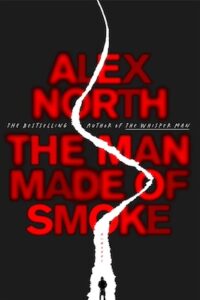
Serial killer thrillers are a dime a dozen, but Alex North’s The Man Made of Smoke is special. Intricately plotted and packing a lot of heart, this novel pulls readers into the story of a serial killer via the life of a man who saw the killed as a kid and did nothing about it.
Dan Garvie saw a serial killer when he was young and it changed his life. As a kid, Dan did nothing, but as an adult, he is a criminal profiler who works tirelessly to get justice for victims and, hopefully, to help prevent some crimes. When his father dies under mysterious circumstances, Dan returns to his small island town and starts looking into his father’s disappearance, which sometimes sounds like a suicide and sometimes like a murder. As Dan pokes around, he starts to think his father’s death might have something to do with the serial killer who changed his life, and he won’t stop until he gets to the bottom of things.
Garvie is clearly the star of the novel and the center of everything, but there are two figures that, while not exactly present, share the spotlight. The first is Dan’s father. Dan talks to him in his head and, once he discovers his father’s boxes full of cold cases, starts working the case with him. Their conversations tend to stick to the case, but North turns that into an exploration of familial dynamics and the way we process trauma. The second figure that is always there without being there is the serial killer. Dan’s guilt is immense and has followed him since childhood, and it all ties back to the killer. Also, there’s a really cool element here: a nonfiction book about the murders that Garvie was obsessed with for a while and that comes back to him as he’s trying to figure things out. Separate, these are all interesting ideas, but stitched together by North’s capable hands, they add up to a narrative that’s hard to put down.
North already has an impressive oeuvre and I’ve loved all of his books so far, but this one might be his best yet.
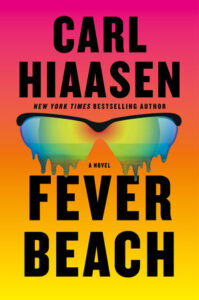
Carl Hiaasen is a funny guy. Hell of a writer, too. Fever Beach, his latest, perfectly captures the zeitgeist of the country, and does so while delivering plenty of humor and social commentary.
Florida can be a weird place, and Dale Figgo fits right in. A raging racist with the IQ of a fence post who was kicked out of the Proud Boys because he couldn’t even create chaos right, Figgo is now the leader of his own group (I’ll let you discover the name of the group by yourself). While on one of his missions to distribute hateful materials to unsuspecting folks, Figgo picks up a hitchhiker and the hits him with his car. The accident snowballs into a situation, and it’s not the only one Figgo is dealing one. Meanwhile Viva Morales, a smart woman working for an old rich couple who rents a room from Figgo and is trying to get her life back together after a divorce, finds herself dealing with a crooked politician and messing with Figgo. Between Figgo, the man he hit with his car, Viva, the crooked politician, and Twilly Spree, who has appeared in Hiaasen novels before, there are a lot of agendas, corruption, jokes, surprises, and enough shenanigans to make this 384-page novel read like a novella.
This is a chaotic, fast-paced, dirty, hilarious novel. Hiaasen, who is a master at writing about Florida, delivers a scathing look at the state of the country and pokes fun at racists nonstop, and that alone is worth the price of admission. Also, the jokes here are nonstop. Between that and the witty dialogue–especially between Viva and Twilly–this novel is as dark as it is hilarious and entertaining.
Talking about Hiaasen’s characters is difficult because he writes about normal people, somewhat weird people, bad people, stupid people, and people who seem to have been pulled from a cartoon. However, much like Who Framed Roger Rabbit, it all works well together.
Between subplots, complications, one-liners, and the many characters Hiaasen juggles, there is always something wild either going on or about to happen, and that makes it hard to put this one down. Definitely one of Hiaasen’s best.
___________________________________
JUNE
___________________________________
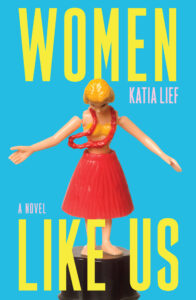
Katia Lief’s Women Like Us surprised me. The crime fiction I gravitate to usually deals directly with violence, but in this novel, the most serious crimes–murder, for example–have already happened. Sure, there is an explosive scene at the end, but the narrative mostly deals with horrible people behaving badly and navigating the world in the aftermath of what they have already done.
Joni Ackerman killed her husband and got away with it. Then, she thrived. Now, Joni owns a production company with her daughter and they have a great project in the works. Then Marc, Joni’s brother who she hasn’t seen in many years, shows up at her place unannounced and throws a wrench into everything before winning over Joni, her daughter, and her beloved dog and then running away and taking the pup with him. Marc has always been a conman and, unbeknownst to Joni, is once again running away from the consequences of his actions after swindling a woman into marrying him using a yet another false name. What follows in a tense story about a family of psychopaths that ends with bloody mayhem.
The best thing about Women Like Us is the way Lief pulls readers into Joni’s emotional and psychological landscape. Joni is a professional, a loving mother and dog owner, and a great friend. She is also a smart, ruthless, conniving killer who is willing to do whatever it takes to get her way. She is likeable and unlikeable, and that complicatedness makes her a memorable character. Also, Joni understands what she and her brother are, but she discovers that her daughter has inherited the nameless thing that makes her and Marc what they are, and the way she is forced to process it and then quickly accept it sort of sets up the novel for the sequel.
Multilayered characters, an engaging premise, snappy dialogue, and everything we learn about Marc and his past lives under different identities make this a fast, entertaining read.
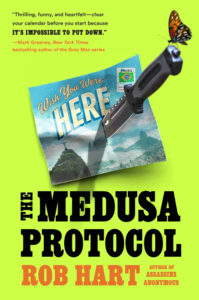
When I get a book in the mail, I usually take a photo and post it on social media. It’s not a review, but as an author, I understand that visibility matters. When I received my galley of Rob Hart’s The Medusa Protocol, I was hit with a memory of doing the same thing for the first novel in the series, Assassins Anonymous. That got me thinking about Hart’s work, which I’ve been reading since New Yorked, the first Ash McKenna novel, which was published in June of 2015. That’s a decade of reading Hart, and he keeps getting better.
Mark used to be one of the best contract killers in the world, but now his life is more about making amends. Mark is sponsoring Astrid, who used to go by Azrael when she killed people for money. Now, Astrid is missing. She’s locked in a private prison somewhere near Brazil where they’re messing with her memory and torturing her. Mark and everyone else at Assassins Anonymous are worried about Astrid’s whereabouts and fear that her previous life might have come back to bite her, but then they receive a pizza with olives, which was an Astrid thing. It could be a mistake or it could be a message. Then a lot of bad men with guns show up and take to take out everyone at Assassins Anonymous.
I think readers can tell when an author was having fun while writing a novel, and this one is as fun as its predecessor. Hart likes writing violence, and he’s good at it. This thing moves at breakneck speed, and the fight scenes are even faster. Also, there’s just as much humor, if not more, in this novel than in the first one in the series.
Confession time! I don’t read a lot of series. I like novels that stand alone, and this one does. Sure, this is the second Assassins Anonymous novel, but there’s just enough context and explanations to make it the kind of book you can pick up and enjoy without having to read the previous one. If you like them fun, fast, violent, explosive, and gritty, don’t miss this one.

For a long time, May Cobb was the only author capable of making me care about novels full of rich, despicable people. Now Kaira Rouda has joined Cobb on that very short list. Jill is Not Happy, Rouda’s latest, is a fun read about rich people hurting each other, and that’s always nice to read about.
Jill Tingley and her husband Jack are a nice couple. They’re a wealthy, good looking duo who fell in love in college and now live a comfortable life in Southern California. However, not everything is as great as it looks from the outside. Jill and Jack have been growing apart for the last couple of years, and now their daughter has gone to college, Jill puts together a road trip that she hopes will help them reconnect and save their marriage. Unfortunately, growing apart is the least of the couple’s problems. A very dark secret that could destroy Jack–and which Jill uses as a weapon constantly–hangs over them at all times. Also, Jack has a lover and is dying to get out of his broken marriage, but Jill won’t let him. No, Jill will do whatever it takes to stay married, and women like Jill don’t take no for an answer.
This is a novel in which both main characters have things to hide. The narrative goes back and forth between Jill and Jack, offering the story from their very particular points of view, which are constantly clashing. The pacing is great, and while the novel suffers from poor editing, the prose if tight and the short chapters keep things moving at all times.
Each couple is a universe full of things, and sometimes those things include dark secrets and constant tensions. Rouda, who developed her chops for characters in turmoil writing romance before successfully making the move to thrillers, understand this deeply, and her works shows it. A perfect book for anyone craving a deep dive into an extremely toxic relationship.

















